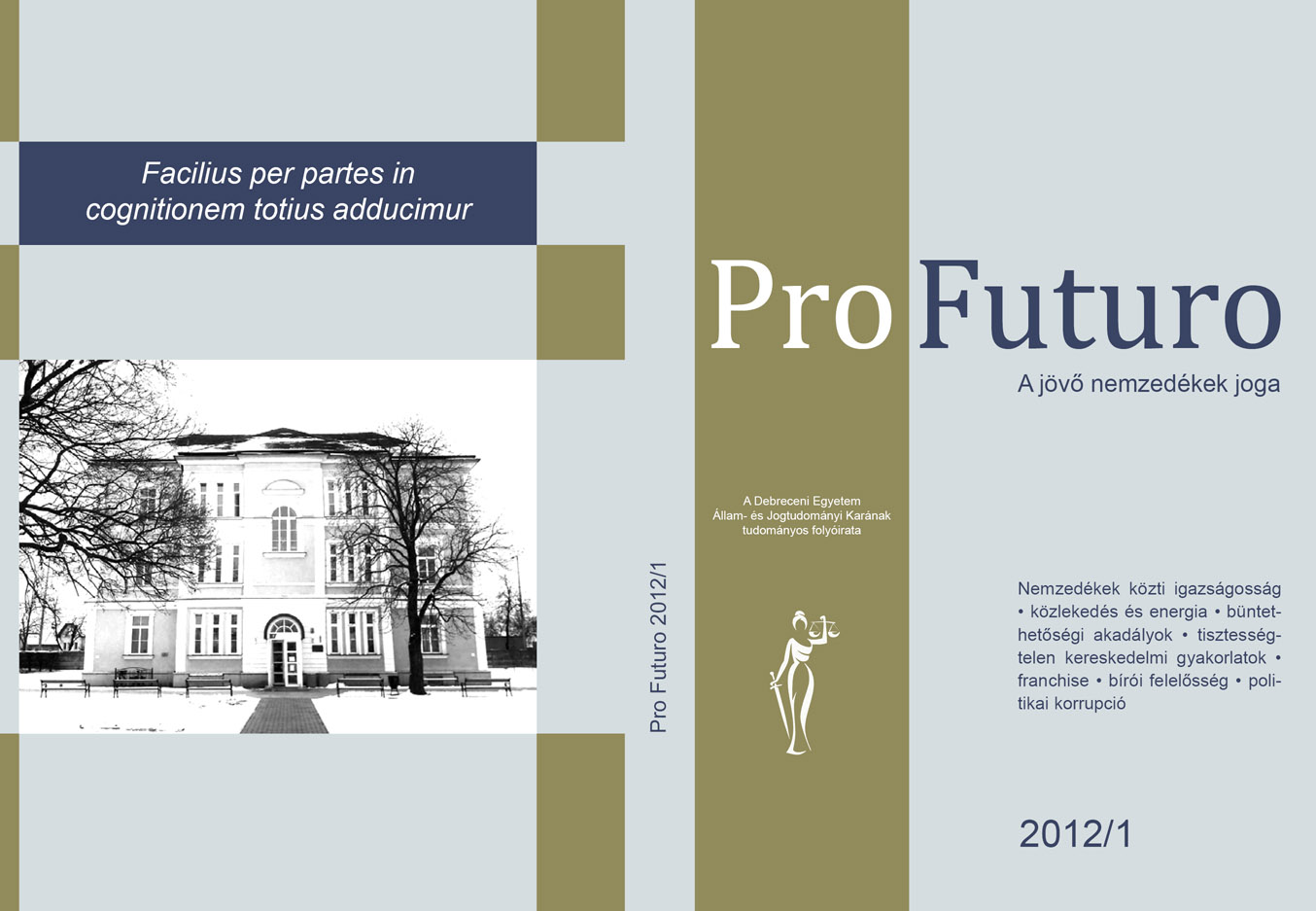Évf. 2 szám 1 (2012)
issue.tableOfContents698ee080e9d91
A főszerkesztő előszava
-
A főszerkesztő előszava
6-7Megtekintések száma:507A Debreceni Egyetem Állam- és Jogtudományi Kara 2011-ben saját folyóiratot alapított, amelynek második számát tartja most kezében a Tisztelt Olvasó.
A főszerkesztő előszavában ismerteti az adott lapszám tartalmát, a cikkekről szóló 5-6 soros leírások (annotációk) formájában. A folyóiratot érintő, legújabb változások mellett itt kap helyet a hátsó borítón szereplő, latin mondás magyarázata.
PDF240
Jog- és államtudomány
-
A nemzedékek közötti igazságosság jogfilozófiai alapjai
8-22Megtekintések száma:474Az igazságosság normatív fogalma már az ókorban is vitatott volt, különféle koncepciói fogalmazódtak meg és érvényesülnek ma is. Az igazságosságról nem általános vagy erkölcsi értelemben, hanem jogi összefüggéseiben kívánok szólni, mégpedig különös figyelemmel a környezet, illetve az erőforrások igénybevételének a kérdéseire. Ez nem jelenti persze azt, hogy az igazságosság klasszikus alaptézisei ebben az összefüggésben érvényüket vesztették volna.
PDF564 -
Egy fenékkel két nyeregben? Az Európai Unió közúti közlekedésre vonatkozó energiahatékonysági és energiatakarékossági szabályozása
23-34Megtekintések száma:203Az energiahatékonyság és energiatakarékosság ösztönzése kiemelt fontosságú az Európai Unió energiapolitikájában. Az energiafelhasználást tekintve az egyes ágazatok közül a közlekedési szektor növekszik a legdinamikusabban, amely így az üvegházhatást okozó gázok leggyorsabban növekvő forrása is egyben. E területen is – akárcsak a klímavédelem egészében – a hatékony szabályozás csak a legkülönfélébb eszközök együttes alkalmazásával biztosítható. Az alábbiakban a személygépkocsikra vonatkozó, általam legfontosabbnak ítélt, kereslet- és kínálatbefolyásoló eszközöket vizsgálom meg az uniós szabályozás szintjén. Idetartoznak egyrészt a fogyasztóknak nyújtott tájékoztatás, a gépjárművek adóztatásának harmonizációja, másrészt pedig a személygépkocsik maximális fajlagos CO2 -kibocsátására vonatkozó követelmények. Célom egyrészt ismertetni a legalapvetőbb előírásokat (már ez a megközelítés is hiányzik a magyar szakirodalomból), másrészt értékelni a hatályos szabályozást. A meghatározó értékelési szempont, hogy vajon az európai szintű szabályozás alkalmas-e a közúti közlekedés energiafelhasználását stabilizálni és hosszú távra is kihatóan csökkenteni.
PDF223 -
Büntethetőségi akadályok a nemzetközi büntetőjogban
35-53Megtekintések száma:207A büntethetőségi akadályok megjelölésére az angolszász jogkörbe tartozó államok jogában, illetve az angol nyelvű jogi szakirodalomban ismert defence kifejezés meglehetősen tág kategória, amely magában foglal minden olyan – jellemzően a védelem által előterjesztett – hivatkozást, érvelést, amely a terhelt felmentésére irányul. Ezzel a kifejezéssel jelölik a vádemelés és az elítélés anyagi jogi és eljárási jellegű akadályait, illetve ezen akadályokra történő hivatkozást egyaránt.
pdf507 -
A tisztességtelen kereskedelmi gyakorlatok magyar szabályozása – kritikai megjegyzések
54-67Megtekintések száma:251Magyarország a tisztességtelen kereskedelmi gyakorlatokról szóló 2005/29/EK irányelv (továbbiakban: UCP irányelv) rendelkezéseit önálló jogszabály, a fogyasztókkal szembeni tisztességtelen kereskedelmi gyakorlat tilalmáról szóló 2008. évi XLVII. törvény (továbbiakban: Fttv.) megalkotásával ültette át a nemzeti jogba. E tanulmány célja annak bemutatása, hogy az Fttv. rendelkezései mennyire felelnek meg a maximum harmonizációból fakadó tilalomnak, vagyis annak a követelménynek, hogy a tagállamok az átültetés során nem térhettek el az UCP irányelv szabályaitól, és azokhoz képest nem vezethettek be és nem alkalmazhatnak sem szigorúbb, sem enyhébb előírásokat (paradox módon még akkor sem, ha az előbbiek révén magasabb szintű fogyasztóvédelem valósulna meg).
pdf660 -
A szerződések tipizálásáról és a franchise szerződésről, az új Ptk. főbizottsági javaslata kapcsán
68-79Megtekintések száma:228A magánjogban az egyes szerződések csoportosítására többféle elhatárolási szempont ismert. Különbséget szokás tenni nevesített (ezen belül tipikus és atipikus), illetőleg nem nevesített (vegyes és de facto) szerződések között. A nevesített szerződések körén belül a tipikus és atipikus szerződések közötti elhatárolás alapját alapvetően az adott szerződés Ptk.-beli nevesítettsége képezi.
pdf896
Bibliográfia
-
A 2010-ben megjelent, jog- és államtudományi tárgyú könyvek annotált bibliográfiája – 2. rész
105-138Megtekintések száma:286Folyóiratunkban rendszeresen jelenik meg az elmúlt időszak új, hazai szakkönyveiről készült, annotált bibliográfia. Az annotáció a könyv felhasználhatóságáról írott, rövid, tényszerű leírás, amely a bibliográfiai adatok mellett meghatározza a műfajt, illetve röviden körvonalazza a feldolgozott témát és a bemutatott eredményeket is. Az annotációk szerzői valamilyen formában kivétel nélkül kötődnek a Debreceni Egyetem Állam- és Jogtudományi Karához, legyen szó munkatársainkról, óraadóinkról vagy hallgatóinkról, PhD-hallgatóinkról. Ebben a számban a 2010-ben megjelent könyvekről készült leírások második részét közöljük.
pdf222
Szemle
-
Az angol bírák „megfegyelmezése” a 21. században
80-86Megtekintések száma:221Ott, ahol a bíró nem leterhelt tisztviselő, perpatvarokat eldöntő jogalkalmazó, hanem jogalkotó, és egy erőteljes hatalmi ág jól fizetett, független, megbecsült képviselője, vajon milyen tere van a számon kérhetőségnek? Régóta rejtélye ez a common law jogrendszereknek. Jóllehet globális problémának számít a bírói függetlenség és számon kérhetőség egyensúlyának megteremtése, és a kontinentális és common law jogcsalád konvergenciája ezen a területen is szembeötlő, igazán élesen éppen a fenti kérdés miatt az angolszász országokban vetődik ez fel.
pdf245 -
A politikai korrupció természete
87-97Megtekintések száma:197A cikk Samuel Issacharoff tanulmányának (Harvard Law Review 124. évfolyam, 1. szám, 2010. november, 119–142.) legfontosabb téziseit foglalja össze, illetve helyenként túl is lép a puszta összefoglalás keretein: egyrészt azáltal, hogy az eredeti szöveg utalásait, így különösen az Egyesült Államok Legfelső Bíróságának gyakorlatára vonatkozó megjegyzéseket a könnyebb érthetőség kedvéért további magyarázatokkal bővíti ki; másrészt pedig úgy, hogy zárásként kapcsolódási pontokat mutat be Issacharoff tételei és a hazai társadalomtudományi diskurzus fontosabb elemei között.
PDF71 -
Az európai földszabályozás aktuális kihívásai
98-104Megtekintések száma:216Könyvismertető Az európai földszabályozás aktuális kihívásai című könyvről. (Szerk.: Csák Csilla, Novotni Kiadó, Miskolc, 2010.)
pdf242

